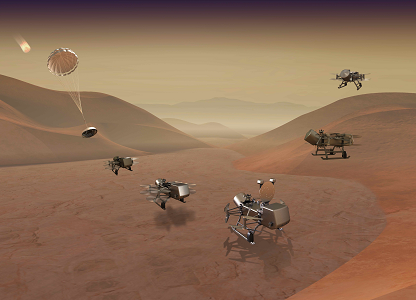 |
|
Astrophysical and Planetary Sciences Colloquium
Monday, February 28, 2022 at 3:35 JILA Auditorium and https://cuboulder.zoom.us/j/96468671083 Zibi Turtle, Johns Hopkins/APL "Dragonfly: In Situ Exploration of Titan's Prebiotic Chemistry and Habitability"  Abstract:Saturn's largest moon, Titan, is an ocean world with a dense atmosphere, abundant complex organic material on its icy surface, and a liquid-water ocean in its interior. The joint NASA-ESA Cassini- Huygens mission revealed Titan to be surprisingly Earth-like, with active geological processes and opportunities for organic material to have mixed with liquid water on the surface in the past. These attributes make Titan a singular destination to seek answers to fundamental questions about what makes a planet or moon habitable and about the pre-biotic chemical processes that led to the development of life here on Earth. NASA's Dragonfly New Frontiers mission is a rotorcraft lander designed to perform wide-ranging in situ investigation of the chemistry and habitability of this fascinating extraterrestrial environment. Taking advantage of Titan's dense atmosphere and low gravity, Dragonfly can fly from place to place, exploring diverse geological settings to measure the compositions of surface materials and observe Titan's geology and meteorology. Dragonfly will make multidisciplinary science measurements at dozens of sites, traveling up to ~180 km during a 3.3-year mission to characterize Titan's habitability and determine how far organic chemistry has progressed in environments that provide key ingredients for life.
|